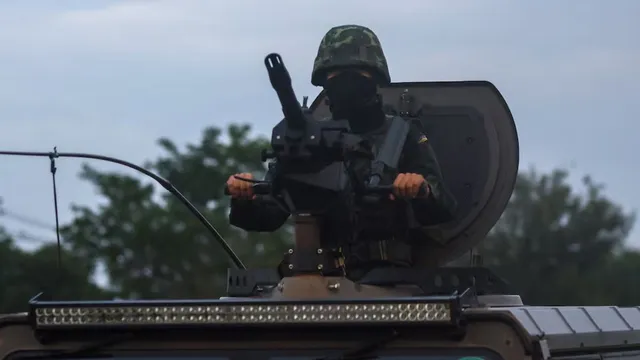- By Supratik Das
- Fri, 25 Jul 2025 12:11 PM (IST)
- Source:JND
Thailand-Cambodia Border dispute: Amid escalating violence along the disputed Thailand-Cambodia border, the Indian Embassy in Thailand has put out a travel advisory for Indian tourists, advising them to exercise extreme caution, be cautious, and regularly review official announcements from Thai authorities, such as the Tourism Authority of Thailand (TAT) newsroom. The advisory, posted by the Embassy of India in Thailand on platform X (previously Twitter), explicitly cautioned travellers against visiting seven provinces directly adjacent to the tense border, where intense battles between the military have resulted in a minimum of 14 Thai nationals killed and tens of thousands displaced. “In view of the situation near the Thailand-Cambodia border, all Indian travellers to Thailand are advised to check updates from Thai official sources, including the TAT Newsroom. As per the Tourism Authority of Thailand, places mentioned in the following link are not recommended for travelling,” said the embassy in its release.
In view of the situation near Thailand-Cambodia border, all Indian travelers to Thailand are advised to check updates from Thai official sources, including TAT Newsroom.
— India in Thailand (@IndiainThailand) July 25, 2025
As per Tourism Authority of Thailand places mentioned in the following link are not recommended for… https://t.co/ToeHLSQUYi
According to Thailand’s Public Health Ministry, the recent border clashes have left 14 Thai citizens dead, including 13 civilians and one soldier, while at least 46 others have been injured in the cross-border fighting. Cambodia has not issued an official report on its casualties, but local media suggest major damage has occurred on both sides. The violence broke out earlier this week after a landmine blast injured five Thai soldiers, leading to tit-for-tat accusations and military action. The Thai Air Force responded with F-16 fighter jet attacks after Cambodian forces allegedly fired truck-mounted rockets across the border into Thailand.
Thailand has accused Cambodia of laying new Russian-manufactured landmines along the border, a claim Phnom Penh denies as unsubstantiated, attributing it instead to residual unexploded ordnance from previous conflicts. Because of the continuing conflicts, the Tourism Authority of Thailand has labeled a number of sites in seven eastern provinces, Ubon Ratchathani, Surin, Sisaket, Buriram, Sa Kaeo, Chanthaburi, and Trat as not suitable for visitors. The zones are near the contested parts of the 817-km-long border, which has been a tinderbox for nationalist tensions for more than a century.
Ancient Temples At Heart Of Deadly Dispute
At the heart of the fatal standoff is the old Ta Muen Thom temple and historic Preah Vihear temple, both of which have been disputed by Thailand and Cambodia for decades. The International Court of Justice ruled in 1962 that Preah Vihear belonged to Cambodia and reiterated its decision in 2013, but Thailand claims ownership of the surrounding land. The current conflict has witnessed the use of heavy artillery, air bombings, and evacuations of civilians. Cambodian officials report that Thai air raids struck along roads adjacent to Preah Vihear, a UNESCO World Heritage monument, and have threatened to take legal action, labeling the airstrikes as a breach of international law.
The violence along the border has triggered a bitter diplomatic row. The two nations have thrown out each other's ambassadors, and Cambodian Prime Minister Hun Manet has summoned the UN Security Council to meet urgently to resolve what he termed as "unprovoked and premeditated military aggression" by Thailand. The Thai Foreign Ministry, however, maintains that it acted in self-defence, accusing Cambodia of breaching international norms and attacking civilians. United Nations Secretary-General António Guterres has called on both countries to "exercise maximum restraint and solve disputes through peaceful dialogue." The violence represents the worst conflict between Thailand and Cambodia in more than a decade.
Historic Tensions And Unresolved Border Disputes
The border dispute between Thailand and Cambodia has its origins in colonial maps delineated by France in 1907. Attempts at resolving the delimitation through a Joint Boundary Commission, established in 2000, have been slow to bear fruit. In the past, nationalism has previously erupted over rival claims to ancient monuments, such as the 11th-century Hindu temples straddling the frontier. Earlier this year, things worsened when there was a leaked controversial telephone call between then-Thailand Prime Minister Paetongtarn Shinawatra and former Cambodian premier Hun Sen, which sparked outrage in Thailand and further fueled border tensions.
So far, Thai officials said more than 130,000 people have been moved from danger zones along the border to safety. On the Cambodian side, some 12,000 families have been moved from areas up front. Despite past pledges for dialogue, recent talks have failed to de-escalate the crisis. Cambodia has now threatened to refer unresolved border sections to the International Court of Justice again, while Thailand insists any solution must come through bilateral negotiations, but only if Cambodia halts its offensive. The Indian Embassy in Thailand has reissued its travel advisory to Indian citizens to exercise caution, watch local media, stay away from closed provinces, and comply with Thai instructions as the situation unfolds.

